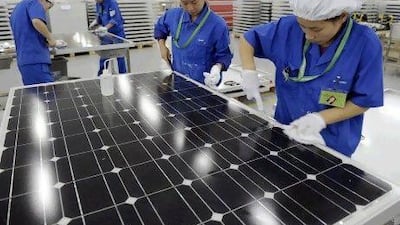"Green sukuk" implies two sets of standards - environmental credentials and Sharia compliance - which helps explain why for now, it is merely a developers' dream.
Are you the strongest link?
Business Quiz 2011 Do you have your finger on the pulse of business? Take our online contest for your chance to win brunch for two. Take the quiz
But industry executives plan to begin crafting guidelines next year to create the world's first environmentally friendly Islamic finance, and calls are increasing for green-themed debt instruments to help raise the money needed to combat climate change - more than US$10 trillion (Dh36.73tn) over the next two decades, according to the International Energy Agency.
Dubai hopes to issue green sukuk to finance solar parks, biogas plants and energy efficiency devices for homes.
"I am trying to raise the appetite. We have the projects, so we just need to identify which one is best to basically lead the way," said Ivano Iannelli, the chief executive of the emirate's Carbon Centre of Excellence. "It would be a very interesting mode paving the way forward and a success story that investors are likely to follow."
The call for green sukuk comes as other financing prospects look bleaker.
The biggest renewables project in the UAE, Masdar's 100 megawatt Shams 1 solar thermal plant, was backed by $600m in loans from a consortium of international banks. But developers do not expect banks, particularly from Europe, to continue to be as free with project financing in the economic crisis.
Carbon credits, another source of funding for climate change abatement, have declined in the past year due to oversupply fears in Europe and a lack of confidence in the political policy underlying them. UN-issued carbon credits traded in Europe have fallen from €13.69 a tonne in May to below €5 given the lack of widespread commitment outside of the EU for renewing the Kyoto Protocol, the binding treaty to curb carbon emissions that backs the UN credits.
Another financing mechanism to arise from the international negotiating process that spawned Kyoto is the Green Climate Fund, which is meant to funnel $100bn a year by 2030 towards climate change abatement projects in developing nations. But nations have yet to agree on who will pay into the fund and who will run it.
That's where green bonds come in, hopes Sean Kidney, the co-founder of Climate Bonds, a green bonds organisation.
"The world is shifting to these kinds of products in recent years," says Mr Kidney. "The investors don't want to take a haircut. The awareness of macro risks of climate change means that given the choice between a fossil fuel product and a green product where the risk-reward ratio is the same, they will choose the green product."
Proponents say that green sukuk and bonds could provide as much as $300 billion for projects to combat climate change. Last year the value of the global bond market came to about $95tn.
Today the green bond market is only a hundredth of the way there, with about $3bn so far. Of the green bonds, most have ties to the development sector; the World Bank, European Investment Bank, African Development Bank and International Finance Corporation are among the entities that began green issuances starting in 2007.
Demand is strong for commercial banks to issue more green bonds of their own, according to a statement in which Allianz, Swiss Re and a coalition of other institutional investors outlined a desire for more low-carbon investment opportunities.
"As insurers and reinsurers we are conscious of the long-term risks that climate change poses to society and how it will affect pricing of weather risk transfer solutions long term," read the statement this month. "We are also conscious of our role as large investors and see the importance of using our assets to mitigate this risk."
Low liquidity in the low-carbon bond market and a need for more due diligence were holding them back, they said.
Climate Bonds and the Clean Energy Business Council, a UAE trade group, are expected to begin work next year on creating the standards for a green sukuk. Climate Bonds already has a set of standards for bonds that auditors such as KPMG and DNV can use. They submit their findings to Climate Bonds, which slaps its seal on the bond if it meets the criteria.
"It is marketing," says Aaron Bielenberg, the director of the Clean Energy Business Council. "The difference is an issuer like the Government of Dubai can potentially access a different set of investors focused on sustainable investing and can also potentially raise money at lower cost."
That is critical for Dubai given its target of drawing 1 per cent of its energy from the sun by the end of the decade. Next year the Supreme Council of Energy plans to hire a consultant to look at a framework for funding projects, and as soon as next month it could begin looking for the contractor to design and engineer a 10MW solar park that would cost about $30m, according to an industry benchmark of $3 a watt.

